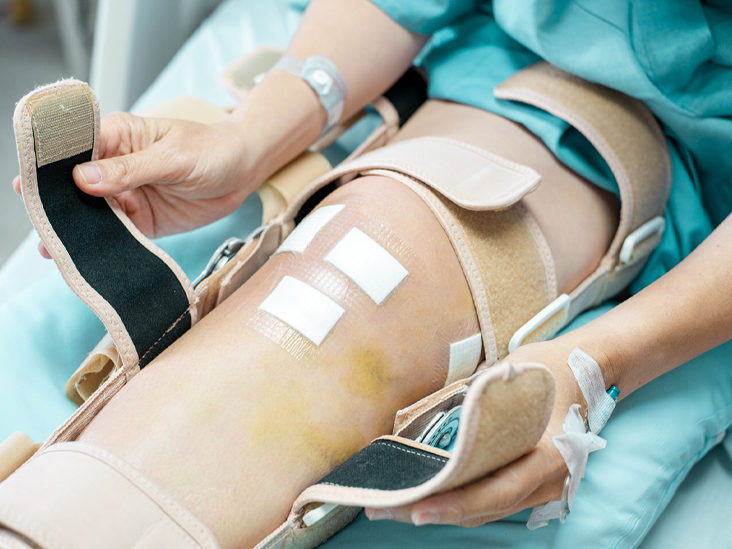What to Avoid After Knee Replacement Surgery

Knee arthroplasty, otherwise known as knee replacement surgery, is designed to relieve pain and restore function in severely diseased knee joints. No matter who you are, you will need physical therapy following a knee replacement, and your therapist will instruct you on how to take care of your knee throughout the recovery process. That being said, there are some important things to avoid following surgery that we will talk about here.
Keep Your Knee Straight
Following a knee replacement, it can be tempting to lay back and put your feet up. However, maintaining a position where your knee is partially bent is bad for your new knee. Therefore, keeping your knee as straight as possible, even while lying down and sleeping, is vital. After your doctor gives you the okay, you can begin to bend your knee and work on your range of motion, usually about seven to ten days after surgery. Again, however, keeping your knee straight while sleeping and resting until the knee is fully healed is essential for proper healing.
Don’t Apply Moisturizer
In order to avoid the risk of infection, you need to keep your incision clean. Putting lotions or essential oils directly on an incision that is not fully closed is simply a bad idea. Once your incision is closed up and healed, your doctor may approve using oils and lotions. If the skin around your incision becomes swollen, red, warm, and drains pus, you may have an infection and need to seek medical attention immediately.
Don’t Kneel on the New Knee
Of course, it may seem obvious that you shouldn’t kneel on your new knee, and most people will not even attempt to due to the stiffness and pain. However, it is vital to ensure you do not kneel on your new knee until your doctor has cleared you. The reason is so that the skin can fully heal and to risk the chance of the incision opening up, which can lead to infection. Although once the incision is healed and you have been cleared, kneeling on a pillow or yoga mat can be an excellent way to desensitize the knee.
Don’t Get Rid of Your Walker or Cane too Soon
It can sometimes be tempting to get rid of the walker as soon as possible and use a cane instead. But you will want to use a walker until you can walk with a cane comfortably because you want to avoid unnecessary pain or strain on your knees, hips, and back. You will need to use an assistive device like a cane or walker until you can walk properly without any limp or pain in your knee or hip.
Don’t Overdo it
It’s normal to want to get better as fast as possible following a knee replacement. Although, during the healing process, it’s essential to be smart about what kind of movement you are doing and how much. In physical therapy, you will be instructed on how to walk correctly, which is a vital step to regaining your mobility. However, walking excessively after knee replacement isn’t a good idea. Listen to your physical therapist and use your assistive device as instructed.
Featured Clinician: Anthony Maritato, PT
FEATURED CLINICIAN: Anthony Maritato, PT Anthony Maritato, PT, MSPT, is a licensed physical therapist and co-founder of Total Therapy Solutions, a private practice outpatient physical therapy business that focuses on
Colleen Rapp Wins Friend of Private Practice Award
Long time patient advocate, Colleen Rapp, was awarded the APTA Private Practice Section’s Friend of Private Practice Award during the 2022 PPS conference. Colleen has long been standing up for
Top Tips for Relieving Nerve Pain
Top Tips for Relieving Nerve Pain If you suffer from nerve or neuropathic pain, then you can certainly attest to how it can throw a wrench in your day-to-day routine.
How Your Diet Can Cause Inflammation
How Your Diet Can Cause Inflammation Depending on the situation, inflammation can be a good thing or a bad thing. It is good in that it is your body’s way
What to Avoid After Knee Replacement Surgery
What to Avoid After Knee Replacement Surgery Knee arthroplasty, otherwise known as knee replacement surgery, is designed to relieve pain and restore function in severely diseased knee joints. No matter
How Physical Therapy Can Help You Avoid Reliance on Pain Medications
How Physical Therapy Can Help You Avoid Reliance on Pain Medications If you suffer from chronic pain, you know how managing pain can be a real challenge. Another day, another
Kyle Yancey
Latest posts by Kyle Yancey (see all)
- Top Tips for Relieving Nerve Pain - October 28, 2022
- How Your Diet Can Cause Inflammation - October 25, 2022
- What to Avoid After Knee Replacement Surgery - October 19, 2022
- How Physical Therapy Can Help You Avoid Reliance on Pain Medications - October 13, 2022
- Physical Therapy for Heart Disease - October 11, 2022
